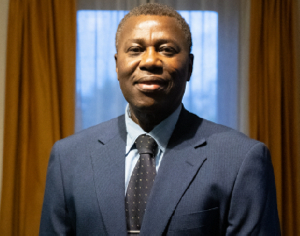In the art of newsgathering, the education beat is not a particularly exciting one. This is because, there is usually nothing sensational to write about, except the well-known stories of flirtatious students who convert classrooms into hotels without the headmaster’s permission. And in the universities where sex is sometimes practiced as a lucrative trade, news of a rendezvous involving a banku seller and two postgraduate students will not make the headlines. Even in the most abhorrent cases of cheating and selling of grades, the political angle is what interests newsmongers. So, often, the bland stories that make the news are the cliché-ridden statements by politicians and academics about the falling standards of education in a particular setting. And because standards are falling everywhere, especially in journalism (we couldn’t even get a soul to pretend that he is the best journalist this year) news about falling standards do not titillate our consciousness in the way that a cocktail of waste and fraud in a particular government agency would. So, when I read last week that a lecturer of the Sunyani-based Catholic University, Dr Kofi Bobi Barimah, is urging Ghanaians to choose the University of Ghana-affiliated learning institution over popular Canadian universities, I thought that was news indeed.
But, then, how newsy is Dr Barimah’s news, and how does it fit in the scheme of things? Just after the duel between my friend and former roommate, Egbert Faibille, managing editor of the Ghanaian Observer, and GIMPA Rector Dr Stephen Adei would end, I had started my own battle with a former London college administrator. I had written about the poor quality of education at some private universities and colleges in the UK. The article was a response to a BBC investigation into the activities of bogus universities and colleges in the UK. The investigation had focused on a certain Irish International University, which, as the respected broadcasting organisation reported, was no university at all. Indeed, the chancellor of the University, Chartered Accountant Byron Knowth, had confessed that the whole thing was ‘dodgy’. The university’s website had been ‘dreamt up’ to give an impressive representation of what a university should look like. With that investigation at the background, I wrote a two part article under the heading: Bogus universities and Dodgy degrees. In that report, I mentioned some other private teaching institutions that were not promoting scholarship in the way a good university would purport to do. I cited the City Banking College in London, a place that most African immigrants in the UK got MBA degrees on the cheap. I also mentioned the Commonwealth Law College in Algate, London, a college affiliated to a certain Victoria University somewhere in Switzerland, where an MBA only cost some 3,000pounds.
The articles provoked some reaction from former students of the school, including one from a very sincere reader who had experienced the City Banking MBA education. The chap confessed that the MBA course, which was based on the Leicester University’s Business School curriculum, did not match the quality at the Leicester-based university. And, at the time I wrote the article, the MBA prgramme at the college had been discontinued because Leicester University felt City Banking was bringing the quality down. So, when I received a threatening email from Mr. Steven Hail, a former Director of studies of the City Banking College, and presently Adjunct lecturer at University of Adelaide, warning of libel charges, I took it with a whole Siberian saltmine. It is not unusual to have a sentimental attachment to something you hold dear, especially, if you have a stake in it. And, if Dr Bobi Barimah’s assessment of the Catholic University is based on nationalism rather than on scholarship and quality, then I would treat his statements with the same degree of disinterest I did Steven Hail’s. My difficulty, however, is that, because Dr Barimah and I are in the process of building a respectable relationship, I would pretend to be interested, and maybe do the Ostrich in a way that the graceful animal has never done. Perhaps, it is also because I am Sunyani born and bred, and my father’s church still sits on Sunyani land. So I have more than a ‘native’ responsibility to guide and protect the academic integrity of the Fiapre-based Catholic University.
For reasons that now appear very worthwhile, I visited the Catholic University when I was in Ghana last year. The university was then accommodated by the Roman Catholic Church, at the premises of the plush pastoral centre. The atmosphere at the centre was very conducive for academic work, with lectures held in what appeared to be comfortable halls. The demeanour of the students was also quite academic, making my days at the Commonwealth Hall of University of Ghana seem too relaxing, on hindsight. But most of the students looked only a little older than lactating babies. Of course, these were senior secondary school graduates, most of whom were still in their otto-phister days. There was that air of a central authority controlling affairs on the campus. There were also visible indications that the pastoral centre was a temporary accommodation for the university; provocative pictures of the new university at Fiapre had boldly been plastered on every available notice board. Dr Barimah’s office, where I had the pleasure to sit in a comfortable chair and exchange pleasantries with the academic, was more IT-friendly than some of the offices of my Legon lecturers. This was a young university, and most things were understandably in their embryonic stages. I left the pastoral centre a very pleased man. But the thoughts in my head were not that pleasing: If the University of Ghana, where I took two gorgeous degrees, is the only inspiration for the Catholic university, then it means the Sunyani-based college would one day be facing the same challenges that the Legon Ivory Tower faces today. Well, not necessarily.
So, what are the problems in our universities today? At least, I am confident that all our tertiary institutions are doing one or two things better than the Irish University. But we are still behind in many things. For the not-so-honourable reason of comparison, I paid two Canadian universities a visit: Carleton University and the University of Ottawa. What struck me at Carleton was not the imposing architecture, because Legon is also quite beautiful and particularly well planned; it was the university’s newspapers. The School of Communication Studies at the University of Ghana, where journalism is taught at the postgraduate level, has not been able to produce a monthly paper for the Legon community. If there ever was a regular Legon newsletter that was accessible to students, I never saw one during my five year adventure in the university. So, when I picked two good newspapers: Carleton Now, a monthly community newspaper, and The Carleton, a weekly, I didn’t know what to think of my journalism degree. These were good newspapers complete with quality pictures and very clean printing, something our commercial private newspapers are still struggling with. The University of Ottawa also has a good newspaper. I also visited Algonquin College, a populated institution that would pass for a polytechnic in our republic. I was impressed to have held Algonquin News, the college’s newspaper in my palm. Their language laboratories were ultra-modern. They also had free local newspapers that sold outside the campus for $1:50
Let’s assume that an institutional newspaper is a luxury and consider the more serious issues of quality of student life, academic programmes, infrastructure, quality of teaching and rewards for lecturers. Universities in the west offer more variety in terms of academic programmes. Perhaps, the only course yet to be introduced onto the curricula of most western universities is magic, but a generous combination of physics and religion would equal the credit hours required for a magic degree. It is difficult to say whether the quality of teaching in universities abroad is better than the kind delivered in our universities. This is because most of our lecturers would have taught in universities in the west before coming home to help their country, as they always put it. So it is assumed that they come with rich experience, and often deliver quality results. And the rewards are not as bad as NAGRAT often makes it appear. A Ghanaian national who works for the Canadian federal government, is presently considering packing her belongings to go and teach in Ghana. She visited her university and learnt of the salaries of junior lecturers. A quick arithmetic showed that she has been shortchanging herself for the better part of a decade. The Ghanaian university would pay for the cost of shipping, together with plane fares for her entire family to Ghana. She benefits from a campus accommodation, so wouldn’t need to pay for a mortgage, a monthly ritual that eats into her tithes for God.
Going back home sits well with people with PhD qualifications, but for the average Ghanaian student who wants to build a tasty CV, western education provides an irresistible allure. Before I left England this year, some academics in the English educational establishment were expressing great concern about the ‘bad influence’ of international students on English education. The contention had been that universities that source their funding from proceeds of fees paid by international students usually do not care very much about the academic preparation the students receive. Students were merely passed through a degree mill and passed off as sausages. In any case, why would an educational institution target only international students? That is what incensed me about the City Banking College, and as if international students are economic units rather than brains on a moving body, the college’s website makes it clear that the international student is their target. Why is it not attractive to the British nationals? It is always important to stress that most British universities are giving international students good exposure and training, the kind they would be happy to receive in their home countries.
International students in Canada do not appear to have a raw deal, despite the zero temperatures. There are bogus colleges, but the attraction is juicier compared to the Catholic university in Fiapre. For instance, an international student who completes a higher degree programme has the option of gaining permanent residence in Canada on the highly skilled programme. There is also the choice of going to America for a share of the Great Dream. But, that is exactly where the Oedipean Sphinx oracle answered the riddle: it could all turn out a dream, in which case the reality at the Catholic University would be much better. Besides, there isn’t any point pursuing an expensive dream when an affordable reality sits next door. Even so, it appears Dr Barimah has a lot of convincing to do, because persuasion has often failed to tame the Abrokyire dream.
Benjamin Tawiah is a freelance journalist. He lives in Ottawa, Canada.
Email: btawiah@hotmail.com, quesiquesi@hotmail.co.uk
Opinions of Thursday, 13 November 2008
Columnist: Tawiah, Benjamin














